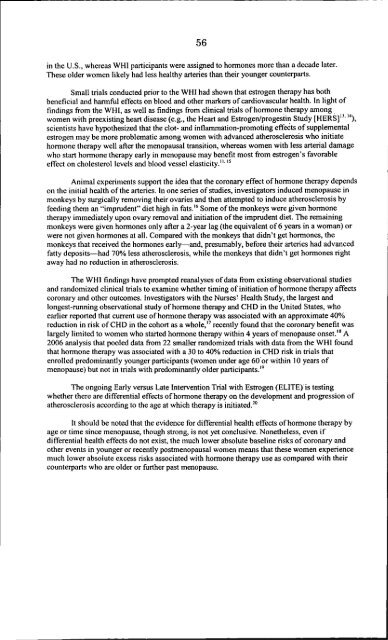Bioidentical Hormones - U.S. Senate Special Committee on Aging
Bioidentical Hormones - U.S. Senate Special Committee on Aging
Bioidentical Hormones - U.S. Senate Special Committee on Aging
You also want an ePaper? Increase the reach of your titles
YUMPU automatically turns print PDFs into web optimized ePapers that Google loves.
in the U.S., whereas WHI participants were assigned to horm<strong>on</strong>es more than a decade later.<br />
These older women likely had less healthy arteries than their younger counterparts.<br />
56<br />
Small trials c<strong>on</strong>ducted prior to the WHI had shown that estrogen therapy has both<br />
beneficial and harmful effects <strong>on</strong> blood and other markers of cardiovascular health. In light of<br />
findings from the WHI, as well as findings from clinical trials of horm<strong>on</strong>e therapy am<strong>on</strong>g<br />
women with preexisting heart disease (e.g., the Heart and Estrogen/progestin Study [HERS]' 14)<br />
scientists have hypothesized that the clot- and inflammati<strong>on</strong>-promoting effects of supplemental<br />
estrogen may be more problematic am<strong>on</strong>g women with advanced atherosclerosis who initiate<br />
horm<strong>on</strong>e therapy well after the menopausal transiti<strong>on</strong>, whereas women with less arterial damage<br />
who start horm<strong>on</strong>e therapy early in menopause may benefit most from estrogen's favorable<br />
effect <strong>on</strong> cholesterol levels and blood vessel elasticity.' '5<br />
Animal experiments support the idea that the cor<strong>on</strong>ary effect of horm<strong>on</strong>e therapy depends<br />
<strong>on</strong> the initial health of the arteries. In <strong>on</strong>e series of studies, investigators induced menopause in<br />
m<strong>on</strong>keys by surgically removing their ovaries and then attempted to induce atherosclerosis by<br />
feeding them an "imprudent" diet high in fats.' 6 Some of the m<strong>on</strong>keys were given horm<strong>on</strong>e<br />
therapy immediately up<strong>on</strong> ovary removal and initiati<strong>on</strong> of the imprudent diet. The remaining<br />
m<strong>on</strong>keys were given horm<strong>on</strong>es <strong>on</strong>ly after a 2-year lag (the equivalent of 6 years in a woman) or<br />
were not given horm<strong>on</strong>es at all. Compared with the m<strong>on</strong>keys that didn't get horm<strong>on</strong>es, the<br />
m<strong>on</strong>keys that received the horm<strong>on</strong>es early-and, presumably, before their arteries had advanced<br />
fatty deposits-had 70% less atherosclerosis, while the m<strong>on</strong>keys that didn't get horm<strong>on</strong>es right<br />
away had no reducti<strong>on</strong> in atherosclerosis.<br />
The WHI findings have prompted reanalyses of data from existing observati<strong>on</strong>al studies<br />
and randomized clinical trials to examine whether timing of initiati<strong>on</strong> of horm<strong>on</strong>e therapy affects<br />
cor<strong>on</strong>ary and other outcomes. Investigators with the Nurses' Health Study, the largest and<br />
l<strong>on</strong>gest-running observati<strong>on</strong>al study of horm<strong>on</strong>e therapy and CHD in the United States, who<br />
earlier reported that current use of horm<strong>on</strong>e therapy was associated with an approximate 40%<br />
reducti<strong>on</strong> in risk of CHD in the cohort as a whole," recently found that the cor<strong>on</strong>ary benefit was<br />
largely limited to women who started horm<strong>on</strong>e therapy within 4 years of menopause <strong>on</strong>set.' 8 A<br />
2006 analysis that pooled data from 22 smaller randomized trials with data from the WHI found<br />
that horm<strong>on</strong>e therapy was associated with a 30 to 40% reducti<strong>on</strong> in CHD risk in trials that<br />
enrolled predominantly younger participants (women under age 60 or within 10 years of<br />
menopause) but not in trials with predominantly older participants."<br />
The <strong>on</strong>going Early versus Late Interventi<strong>on</strong> Trial with Estrogen (ELITE) is testing<br />
whether there are differential effects of horm<strong>on</strong>e therapy <strong>on</strong> the development and progressi<strong>on</strong> of<br />
atherosclerosis according to the age at which therapy is initiated." 0<br />
It should be noted that the evidence for differential health effects of horm<strong>on</strong>e therapy by<br />
age or time since menopause, though str<strong>on</strong>g, is not yet c<strong>on</strong>clusive. N<strong>on</strong>etheless, even if<br />
differential health effects do not exist, the much lower absolute baseline risks of cor<strong>on</strong>ary and<br />
other events in younger or recently postmenopausal women means that these women experience<br />
much lower absolute excess risks associated with horm<strong>on</strong>e therapy use as compared with their<br />
counterparts who are older or further past menopause.
















